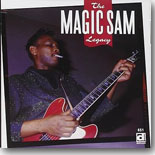|
Magic Sam
The Magic Sam Legacy
Delmark Records |
 It
was a few years into my interest in blues music
that I discovered Magic Sam. In more
modern times, information about just about
anything is available at the push of a button or
just by asking Alexa or Siri. But during that
period of darkness we know as the late 1980s,
information was not quite as easily accessible.
It
was a few years into my interest in blues music
that I discovered Magic Sam. In more
modern times, information about just about
anything is available at the push of a button or
just by asking Alexa or Siri. But during that
period of darkness we know as the late 1980s,
information was not quite as easily accessible.
I saw a Delmark Records ad for Magic Sam’s
West Side Soul and Buddy Guy and Junior
Wells’ Hoodoo Man Blues in a Roundup
Records catalog. I had seen both albums listed
as part of Living Blues’ “Top Ten Desert Island
Discs” survey, but was unfamiliar with either of
them and decided to try them both out. In
retrospect, it was a wise decision on my part.
A few months later, now in 1990, I ventured to
Clarksdale, Mississippi for the first time and
discovered the Delta Blues Museum and Stackhouse
Records (the predecessor to Cathead for
blues-related product in Clarksdale). As I was
perusing the cassette tape section, I discovered
a new Magic Sam collection called The Magic
Sam Legacy, also on Delmark Records, so
needless to say, I snatched it up as quickly as
I could. I had no idea what was on it, but I was
impressed enough with what I’d already heard
from Magic Sam to take a leap of faith.
The Magic Sam Legacy collects 13 tracks,
11 of which were recorded and initially unused
from Sam’s two Delmark releases, 1967’s West
Side Soul and 1968’s Black Magic,
plus a couple of tracks recorded in 1966.
The first two tracks are the 1966 selections, “I
Feel So Good” and the instrumental “Lookin’
Good,” which was originally intended for an
aborted label, cut by Bill Lindeman. Sam is
backed by Eddie Shaw (tenor sax), Mac Thompson
(bass), and Robert Richey (drums). Since these
tracks were re-cut for West Side Soul,
Delmark opted not to use these versions at the
time.
The next four tracks include an alternate take
of “That’s All I Need” from West Side Soul,
plus three tracks that were not included on the
album. These tracks --- two from Jimmy Rogers (“Walkin’
By Myself” and “That Ain’t It”) plus the blues
standard “Hoochie Coochie Man” --- are fine
covers and may have been omitted due to time
constraints.
“That Ain’t It” features a particularly soulful
vocal from Sam that indicates he might have
ventured into the R&B genre a bit more had he
lived longer. These tracks also feature
harmonica from Shakey Jake, additional guitar
from Mighty Joe Young, Thompson on bass, and
Odie Payne, Jr. on drums.
Black Magic is represented by the last
seven tracks on the disc. Four of the tracks,
“What Have I Done Wrong,” “I Just Want A Little
Bit,” “Easy Baby,” and “Keep On Lovin’ Me Baby,”
are alternate takes. “Everything’s Gonna Be All
Right” is a remake of one of Sam’s classic Cobra
sides that could have easily made the final cut,
and “Keep On Doin’ What You’re Doin’” is a solid
mid-tempo West Side blues.
My favorite song on the disc is the
instrumental, “Blues For Odie Payne,” a slow
burner which really showcases Sam’s fretwork and
the seamless interplay between his guitar and
Eddie Shaw’s tenor sax. It’s a side of Magic Sam
that you don’t usually hear, as he encourages
each musician through their respective solos.
Other contributing musicians on these tracks are
Young, Shaw, Thompson, Payne, and Lafayette
Leake on piano.
For most of the alternate versions, they are
very good, but there’s no question that the
better cuts made the final albums. Maybe Mighty
Joe Young’s guitar solo on “Just A Little Bit”
is a bit less robust than the album version (or
lower in the mix). Or maybe the instrumental
sections are a big longer or shorter, but these
sides are as intriguing as the final choices for
the albums. It’s also pretty cool to hear some
of the studio banter that precedes a few of the
songs.
Magic Sam’s tragic death at the age of 32 is one
of the big “What Might Have Been” questions in
music. He was primed to sign with Stax Records
after fulfilling his Delmark contract, so
there’s no telling where his path would have
led.
For newcomers to the talents of Magic Sam, I
would still recommend checking out West Side
Soul and Black Magic first, and the
Cobra sides, of course. But The Magic Sam
Legacy is a wonderful collection of tunes
and the first place to turn once you’ve sampled
the other releases.
---
Graham Clarke